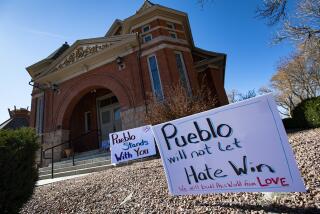Bail Sought for Suspect in Church Bomb Plot : Violence: Family and friends offer to put up property to get Christopher David Fisher released pending trial. His lawyer expects him to be indicted and says he will plead not guilty.
The parents of Christopher David Fisher, who was arrested last week and charged with plotting to blow up the First African Methodist Episcopal Church, are rounding up friends and neighbors willing to put up their property to help the Long Beach man get out on bail, Fisher’s lawyer said Monday.
“Their main goal is to put their property together so that he can make bail,” said attorney Anna Ho. “This young man just should not be in jail.”
Ho said she expects Fisher to be indicted, adding that he will enter a plea of not guilty. Although U.S. Atty. Terree A. Bowers declined to comment on Ho’s request for her client to be freed on bail, prosecutors last week successfully urged a magistrate judge to deny that request, arguing that Fisher posed too great a risk to be allowed to go free.
“I don’t think there’s any condition of release that would reasonably assure . . . the safety of the community,” Judge R.J. Groh Jr. said in denying bail. A hearing has been set for Thursday so that Ho can ask another judge to reconsider that decision.
Fisher, 20, is the alleged leader of the Fourth Reich Skinheads, a shadowy group of white supremacists that authorities say was planning to blow up the First AME Church and murder Rodney G. King. Seven other suspects, including two juveniles, were arrested with Fisher last week, but he is the only adult accused in connection with the plots on King and the church.
One juvenile was arraigned Monday in Long Beach Superior Court on charges of possessing and transporting a bomb; the other faces federal charges. Prosecutors are expected to ask that both juveniles be tried as adults.
Although Ho conceded that it may be difficult to persuade a judge to grant bail for Fisher, she added that Fisher’s family is willing to go to extraordinary lengths to ensure that he will pose no danger if released pending trial.
“His parents are willing to provide 24-hour, personal supervision,” she said.
Ho said Fisher is frightened and overwhelmed by the events of the past few days. “He’s never been in custody,” she said. “It’s very scary for him.”
In an interview, Ho echoed comments made by friends of Fisher’s last week, who say that an undercover FBI agent and two confidential informants coaxed Fisher and other members of the Fourth Reich Skinheads to commit acts of violence. Members of the skinhead group accused the undercover operatives of urging them to talk about committing violent acts and capturing those remarks on videotape.
Ho also questioned the aggressive tactics used against her client and other suspects in the white supremacist probe.
“These are young, impressionable people,” she said. “They may have a certain prejudice, but is it right for the agent to go in and make this worse? I don’t think that’s right.”
Charlie J. Parsons, special agent in charge of the Los Angeles FBI office, said complaints of entrapment are commonly raised by defendants, but that agents are carefully instructed about how to run a surveillance operation and how to avoid entrapping suspects.
As prosecutors and defense attorneys prepared to take the case to court, business people who worked near the site of the Newport Beach undercover operation marveled that the FBI had converted a modest office space into a video-equipped surveillance operation. It was there that a government informant known as the Rev. Joe Allen set up a gym for young skinheads.
Craig Moreland, who owns the business next door, said he never saw any business being transacted. “I wondered why would somebody pay whatever they were paying in rent . . . for one guy to park a car inside,” Moreland said.
Monday, as unidentified men whisked in and out of the site, neighbors recalled seeing suspicious activities that only now began to make sense. Some said the men who ran the operation would unload rifles and other equipment in full view of other business people in the light industrial park.
“That’s what made it weird,” one neighbor said. “These guys were trying hard to make it look like they were doing something illegal.”
More to Read
Sign up for Essential California
The most important California stories and recommendations in your inbox every morning.
You may occasionally receive promotional content from the Los Angeles Times.











